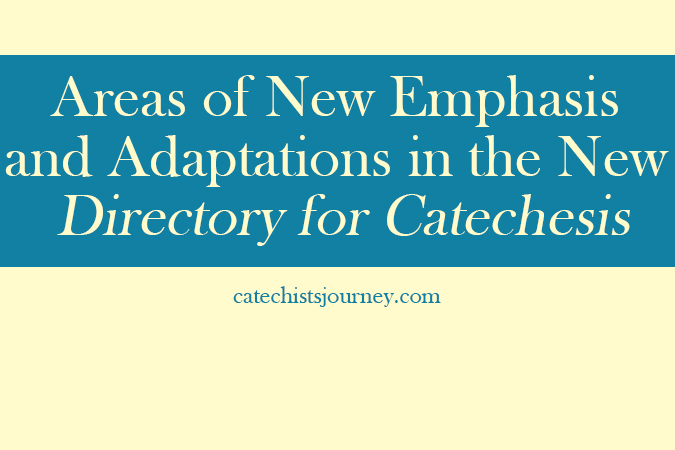
This is part three of a four-part series on the new Directory for Catechesis.
Understanding the process of evangelization is critical for all those engaged in ministry. But before we examine the process of evangelization (which is covered in paragraphs #31–#37 in the new Directory for Catechesis), let’s take a look at how evangelization is defined.
What is evangelization?
Evangelization is “making present and announcing Jesus Christ.” (#29) The ultimate aim of evangelization is nothing less than “the fulfillment of human life.” (#30) Earlier in the document, we read that “Christian faith is, first of all, the welcoming of God’s love revealed in Jesus Christ, sincere adherence to his person, and the free decision to follow him.” (#18) This free decision to follow Jesus is at the heart of the new Directory for Catechesis and the process of evangelization.
What is the process of evangelization?
The process of evangelization includes various stages and moments that “can be repeated if necessary, in view of providing more adequate evangelical nourishment for the spiritual growth of each person or community.” (#32) These phases not only follow one another, but they are also aspects of the entire process. Evangelization arises out of the ministry of the Word of God and is an “ecclesial process inspired and supported by the Holy Spirit, through which the Gospel is proclaimed and spread throughout the world.” (#31)
What is the Church’s role in the process of evangelization?
In paragraph #31, the directory outlines the activity of the Church in the process of evangelization:
- The Church, driven by charity, permeates and transforms the whole world.
- With an attitude of “solidarity, fellowship, and dialogue,” the Church bears witness to the “Christians’ newness of life, so that those who meet them may be prompted to wonder about the meaning of life and the reasons for their brotherhood and hope.”
- Through the first proclamation of the Gospel, the Church issues the call to conversion, initiating people into Christian faith and life through the catechumenal process (catechesis, sacraments, witness of charity, and fraternal experience).
- Through ongoing education in the faith, the celebration of the sacraments, and the exercise of charity, the Church nourishes the gift of communion among the faithful.
- The Church sends disciples of Christ to proclaim the Gospel in the world through works and words.
While this is in keeping with the older General Directory for Catechesis (1997), the language is more dynamic and invigorating.
Are there differences between the 1997 General Directory for Catechesis and the new Directory for Catechesis regarding the process of evangelization?
Not really. The phases and stages in the process of evangelization are similar, but the language is a bit different. However, both documents use the stages of the catechumenate for the basis of the process of evangelization. The table below compares the process of evangelization in the two documents.
| General Directory for Catechesis (1997) | New Directory for Catechesis (2020) |
|---|---|
| Pre-evangelization | Missionary activity as the first stage of evangelization |
| Initial proclamation of the Gospel | First proclamation issues the call to conversion |
| Initiatory catechesis | Initiation into Christian faith and life, through the catechumenal process (catechesis, sacraments, witness of charity, fraternal experience) |
| Mystagogical or postbaptismal catechesis | Mystagogy |
| Permanent or continuing catechesis | Ongoing education in the faith |
What forms of evangelization are mentioned in the directory?
Quite a few forms of evangelization are mentioned in paragraph #37 of the directory. Some of the forms that are mentioned include:
- the first proclamation;
- various types of catechesis;
- the homily and preaching;
- prayerful reading of the Word, such as lectio divina;
- popular piety;
- the biblical apostolate;
- the teaching of theology;
- educational instruction in religion; and
- studies and meetings that explore the relationship between the Word of God and contemporary culture, including through interreligious and intercultural exchange.
What are some other takeaways about the process of evangelization?
The Directory for Catechesis reminds us that the Holy Spirit is at the center of evangelizing activity—the Holy Spirit continually urges us to mission. Within the overall process of evangelization, the directory emphasizes the power of witness, for “missionary activity is the first stage of evangelization.” (#33) Within this stage, witness is expressed as respectful dialogue, which gives way at an appropriate time toward initial or first proclamation. The directory then speaks of the various audiences that first proclamation appeals to, including “seekers of God, nonbelievers, the indifferent, members of other religions, persons who have a superficial or distorted understanding of the Christian faith, Christians with a faith that has become weak or who have fallen away from the Church.” (#33) The Holy Spirit is able to touch the hearts of all human beings regardless of their faith.
This particular section of the document was one that I read multiple times; I’m sure I will continue to unpack its meaning. What questions or insights do you have about the process of evangelization and its relationship to catechesis?





Be the first to comment